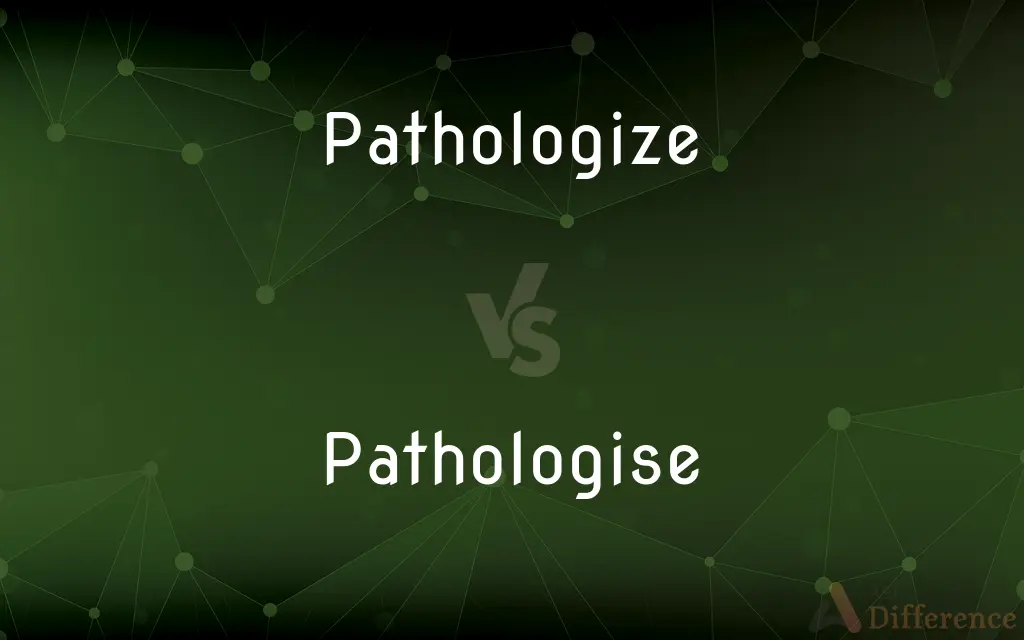Pathologize vs. Pathologise — What's the Difference?
By Tayyaba Rehman & Maham Liaqat — Updated on April 7, 2024
Pathologize (American spelling) refers to viewing or treating something as medically or psychologically abnormal, while pathologise (British spelling) is its UK variant, reflecting the same concept but in British English.

Difference Between Pathologize and Pathologise
Table of Contents
ADVERTISEMENT
Key Differences
Pathologize is primarily used in American English, indicating the process of treating or considering a behavior, condition, or characteristic as pathological or abnormal. This term is often applied in psychological and medical contexts, suggesting that something is not within the normal range and may require intervention. On the other hand, pathologise is the British English spelling of the same term, used in similar contexts but follows the spelling conventions of UK English. This distinction mirrors the general differences in American and British spelling patterns, where American English simplifies certain words by dropping or altering letters.
In academic and professional writing, the choice between pathologize and pathologise depends on the intended audience and the standards of the publication. American journals and texts prefer 'pathologize', emphasizing conciseness and alignment with American English spelling conventions. Conversely, British publications opt for 'pathologise', adhering to the UK's linguistic norms and spelling rules. This differentiation ensures clarity and consistency in communication within different English-speaking regions.
The pronunciation of pathologize and pathologise slightly differs, reflecting the phonetic tendencies of American and British English. While the core pronunciation remains similar, the accent and intonation may vary according to the regional accents of the speakers. This nuance underscores the rich diversity within the English language, allowing for variations that cater to different linguistic communities.
In the broader cultural context, the usage of terms like pathologize and pathologise can reflect differing attitudes towards mental health and medical conditions. In some settings, these terms might be used to critique the medicalization of natural human behaviors or conditions, suggesting a need to reconsider what is deemed 'normal' or 'abnormal'. This perspective fosters a dialogue on the implications of labeling and the societal norms that influence these definitions.
The evolution of language and spelling reflects the dynamic nature of English, with terms like pathologize and pathologise serving as examples of how language adapts to cultural and regional differences. As English continues to evolve, such terms highlight the ongoing dialogue between standardization and variation, encouraging users to be mindful of their audience and the context in which they are communicating.
ADVERTISEMENT
Comparison Chart
Spelling
Pathologize
Pathologise
Usage Context
Preferred in American publications and academic writing.
Preferred in British publications and academic writing.
Pronunciation
Slight variations based on American English phonetics.
Slight variations based on British English phonetics.
Cultural Context
Reflects American English norms and attitudes towards medicalization.
Reflects British English norms and attitudes towards medicalization.
Linguistic Evolution
Example of American English's tendency to simplify spelling.
Example of British English maintaining traditional spelling conventions.
Compare with Definitions
Pathologize
To declare or consider something as medically significant.
The tendency to pathologize normal aging processes can lead to unnecessary treatments.
Pathologise
To identify or label as a medical issue.
The healthcare system tends to pathologise aging, which is a natural life stage.
Pathologize
To categorize a condition or behavior as a disease.
Modern medicine sometimes pathologizes conditions that were once considered normal variances.
Pathologise
To consider a behavior or condition as having medical pathology.
Pathologising everyday stress can lead to overmedication.
Pathologize
To apply a medical model to behaviors or conditions.
Pathologizing grief as a form of depression can overlook its natural healing process.
Pathologise
To question the medical perspective on common behaviors.
The thesis pathologises the medical community's approach to diagnosing learning disabilities.
Pathologize
To critique the medicalization of natural phenomena.
The article pathologizes the quick diagnosis of ADHD in young children.
Pathologise
To treat or view something as abnormal in a psychological context.
Educators should be cautious not to pathologise introversion in students.
Pathologize
To view or treat as psychologically abnormal.
Society often pathologizes shyness in children, viewing it as a disorder.
Pathologise
To frame within a medical discourse.
There is a growing concern about the tendency to pathologise normal emotional responses.
Pathologize
(transitive) To characterize as a pathology or disease; to characterize (a person) as suffering from a disease.
Some childhood behavior has been pathologized as attention-deficit disorder.
Pathologise
Alternative spelling of pathologize
Common Curiosities
How does the cultural context influence the use of pathologize or pathologise?
Cultural attitudes towards health and normalcy can influence how and when these terms are used to describe behaviors and conditions.
Why do American and British English have different spellings for pathologize?
The differences stem from historical spelling conventions and standardization processes in each variant of English.
How does one choose between using pathologize or pathologise in writing?
The choice depends on the intended audience's familiarity with either American or British English spelling conventions.
What does it mean to pathologize something?
To pathologize means to view or treat a behavior or condition as abnormal or pathological.
In what fields is pathologizing a common practice?
Pathologizing is common in medicine, psychology, and sometimes in social discourse and education.
Is the tendency to pathologize increasing?
Some argue that the medicalization of life’s challenges is on the rise, driven by various social and economic factors.
What role does pathologizing play in mental health?
It plays a significant role in diagnosing and treating mental health conditions, though it also raises questions about the boundaries of normalcy.
How has the use of pathologize/pathologise evolved?
Its use has evolved with changing societal norms and medical practices, reflecting broader shifts in understanding health and normalcy.
How does one avoid pathologizing in professional practice?
Professionals can focus on evidence-based practices, consider cultural and individual differences, and promote a nuanced understanding of health and behavior.
Are pathologize and pathologise interchangeable?
Yes, they are interchangeable, but the choice depends on whether you're using American or British English.
Can pathologizing be considered harmful?
Yes, pathologizing normal behaviors or conditions can lead to stigma, misunderstanding, and unnecessary treatment.
Is there a difference in pronunciation between pathologize and pathologise?
The pronunciation differences are minor and mostly reflect the regional accents of American and British English speakers.
Can pathologizing ever be positive?
While it can lead to recognition and treatment of genuine disorders, it can also unnecessarily medicalize normal variations of human behavior.
Do other languages have similar concepts to pathologize/pathologise?
Yes, many languages have terms or concepts that reflect the process of medicalizing or deeming behaviors as abnormal.
Share Your Discovery

Previous Comparison
Official vs. Officially
Next Comparison
Mwahaha vs. MuahahahaAuthor Spotlight
Written by
Tayyaba RehmanTayyaba Rehman is a distinguished writer, currently serving as a primary contributor to askdifference.com. As a researcher in semantics and etymology, Tayyaba's passion for the complexity of languages and their distinctions has found a perfect home on the platform. Tayyaba delves into the intricacies of language, distinguishing between commonly confused words and phrases, thereby providing clarity for readers worldwide.
Co-written by
Maham Liaqat















































